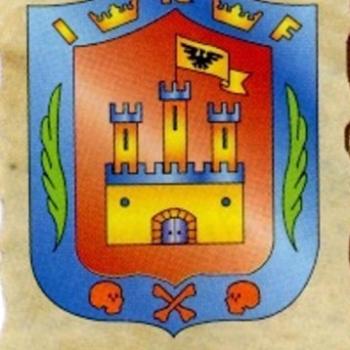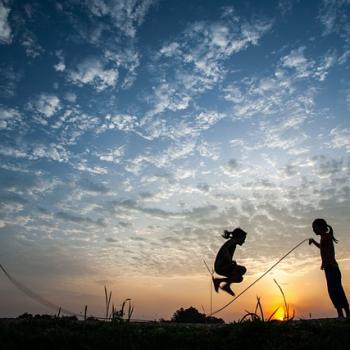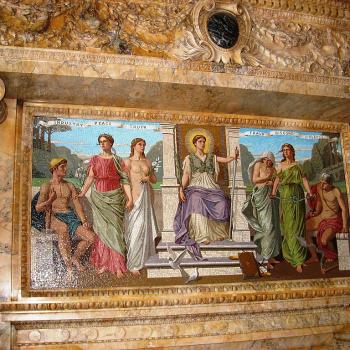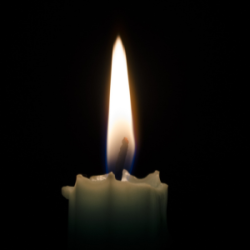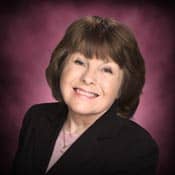I have been asked many times if it is true that when you lose one sense that your other senses are stronger. I reply that it isn't that the other senses automatically become stronger, but that you depend on them more, and so you pay closer attention. My hearing, and sense of touch in particular are how I "see." I have become quite independent, but I know my limits. When I lost my sight, and said that prayer of acceptance asking God to help me to move on with my life, and to use this for his purposes, he answered that prayer.
While God did help me regain my independence, I also had to acknowledge my limits, and to pay more attention to his promptings, and that is another way I "see."
Last Sunday at Mass, one sentence in the homily really stood out to me. "The medicine for hope is purposes from our pain."
I have been writing about personal events in my life, and "God moments," in this column. It isn't that I want to bring attention to myself; I'm much more comfortable staying in the background. Rather, I only want to shine a light on the blessings I have received through these situations. Not that I always see what the Lord is doing while I am in the middle of these things; it is when I get to the end of each road God and I travel that I look back and see what the Lord wanted me to learn.
These events are spaced out in my life. By sharing them, though, I don't want to seem like one of those movies where every amazing thing that has happened in my lifetime is shown in a 2-reel film, making me look like "super blind woman." I hope to see the positives in life, and try to glean what I can from the harder times, because that is how I can make sense of them.
I have been wondering lately what I would have said in these columns had I been writing this when I was losing my sight, or in the middle of any of the other difficult experiences I have been through. It is only while writing about these events now, on the other side of them, that I can write with perspective. In the middle of situations, all I usually see is that moment, like anyone else.
I often feel like Jacob struggling with the "Angel of the Lord." (Gen. 32:24-32) We don't know the end of the story yet, and it isn't easy.
Once I was approached in the grocery store by a woman while I was with my guide dog, minding my own business and selecting produce. She said, "Do you believe in God? If you have strong enough faith, the Lord can heal you."
To be honest, I was annoyed. I gritted my teeth and smiled, keeping my feelings to myself. She wasn't the first person to come up to me that way. I told her that I did have faith that the Lord could heal me, and he already had. I explained that God healed me emotionally -- inside -- and that this was more important than the physical.
She saw that she was getting nowhere, so she finally said that she would pray for me. I thanked her, and told her "I'll pray for you, too!" I felt sorry for this lady, because if she or a loved one of hers faced a serious problem -- as we all do—would she think that it was because she lacked faith?
Perhaps later, when a difficulty arises for her, she will remember that quick moment when our paths crossed, and what I said. Only God knows. St. Paul asked the Lord to take the "thorn from his flesh." God's answer was, "...My grace is sufficient for you, for my power is made perfect in weakness" (2 Cor. 12: 9).
Sometimes our challenges are meant for a greater purpose in our lives, or they are meant to be used by the Lord to better help others, if only we keep our thorn with real acceptance.
This has been true in my own life. If I had not lost my sight, would my faith be the same? I would probably still be depending on myself more than trusting in my "sighted guide." God doesn't cause these things to happen; they are just an allowed part of life.
I don't want to give the impression that I have it all together. I have taken my hand off His arm more than a few times, and when I (figuratively or literally) run into a wall, stumble, or hit a closed door, I think, "that was pretty dumb." He allows me to do that because of my free will, but He is always close by to pick me up, wash off my scrapes, and bandage my soul when I turn back. From these moments of stubborn independence, I learn my limits, and I reach out to Him, to take His arm again and continue on the road.
It's humbling, and that is a good thing; humility is a blessing in itself, and a kind of healer. Jesus is the Divine Healer. If we choose to, we can allow God to use difficult times in our lives to be "medicine for hope and to give purposes from our pain."
3/4/2011 5:00:00 AM
